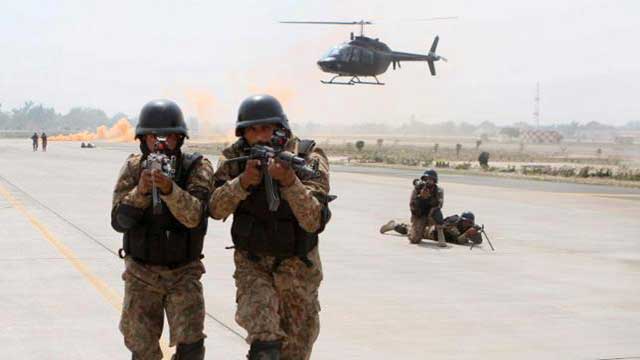A decisive crackdown on extremist and militant organisations in Pakistan looks imminent.
“The action would soon be visible as things progress,” a source told a group of journalists at a background briefing on Sunday.
The imminence of an action against extremist groups was confirmed by Pakistani Information Minister Fawad Chaudhry while talking in DawnNews programme Do Raaye.
He said the government had taken a firm decision that there would be a stern action against all militant groups. This, he said, was in accordance with the political consensus contained in the National Action Plan (NAP).
The information minister refused to give any timeline for the operation against militant groups like Jaish-e-Mohammad (JeM), accused of masterminding the Pulwama attack that triggered the latest crisis with India and took both nuclear-armed rivals close to war, and Jamaatud Dawa (JuD) and its charity wing Falah-i-Insaniat Foundation (FIF). Chaudhry said the timeline was something for the security forces to decide.
The National Security Committee of the country had in its Feb 21 meeting “decided to accelerate action against proscribed organisations” and ordered re-imposition of ban on JuD and FIF.
Pakistani Prime Minister Imran Khan had on that occasion, while emphasising eradication of “militancy and extremism” from society, said the state could not be allowed to “become hostage to extremists”.
Pakistan to review stance on listing of Masood Azhar by UNSC as terrorist
The source categorically denied that the action was in response to Indian pressure after the Pulwama incident and said the decision had been taken much before the Feb 14 attack on Indian security forces in Pulwama, although it became public later. The dossier given by India on the Pulwama attack, he maintained, contained nothing except an iteration of its narrative on alleged Pakistan-based groups.
“We are taking action in our national interest. We have to correct the course. We cannot leave this mess for our next generation,” the source said, adding that the “existing political consensus within the country was an opportunity to take Pakistan on the positive track”.
He said the action would help deal with the issues arising out of the Financial Action Task Force (FATF) listing. Pakistan, despite making significant progress on the initial concerns of FATF, came under renewed pressure at the Paris plenary last month.
The source said at the briefing that there could be law enforcement actions against JeM, JuD and FIF. However, it was clear from the conversation that Pakistan would also review its stance on the issue of listing of JeM leader Masood Azhar by the United Nations Security Council. “No individual is more important than Pakistan,” he said while responding to a question. “Pakistan won’t make it a matter of ego,” he said in response to another. “We won’t test our friends either,” he said in reference to China that has been maintaining a technical hold on Azhar’s listing by the UNSC.
The United States, Britain and France -- three permanent members of the UNSC with veto power -- have again, after Pulwama, moved the Security Council for designation of Azhar as a global terrorist.
When asked why Pakistan had in the past failed in acting against the proscribed groups, the source said the elements of NAP relating to military had been implemented, but those pertaining of civilians lagged behind because of lack of “capacity, capability and will”. He pointed to compulsions of certain political leaders as one reason, but said no one could be absolved of responsibility.
“It was decided in NAP in 2014 that there would action against proscribed groups. That required strategic shift and such changes take time,” he emphasised, observing that time had now come to decisively against these groups.
Talking about the latest confrontation with India in which ‘a strategic pause’ in hostilities was obvious on Sunday, he said it was in the interest of Pakistan to ‘exit’ from the face-off at this stage when it had attained “moral, diplomatic and military ascendancy” over India. However, India’s case was different, he argued, saying that it might be a tough decision for Prime Minister Narendra Modi to de-escalate at this stage because of the political cost. “That’s why they are taking time. Now that the strategic pause is there, they would have gone back to re-evaluate their options.”
Inter-Services Public Relations in its update on the LoC situation on Sunday reported calm after heavy exchanges over the past few days following use of air power by the two countries. “After heavy exchange of fire on night 1st/2nd March there is relative calm along LoC with intermittent fire during last night in Neza Pir, Jandrot and Baghsar sectors,” it said.
PM Modi, the source said, needed a face saving, but “Pakistan would not give one at the cost of its esteem and integrity”. He, however, stressed that Pakistan would at the same time not do anything provocative. Pakistan’s game plan, he said, was based on “rationality” and not “weakness” because any further escalation could lead to disastrous consequences.
mj/





